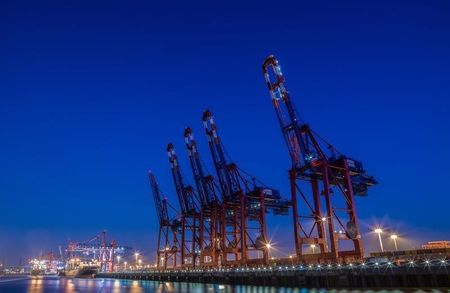BERLIN (Reuters) - German exports will likely grow by 4 percent in 2015 if no new global conflicts emerge, even though Western economic sanctions against Russia are likely to last a long time and may expand further, Germany's BGA exporters' group said on Wednesday.
Germany is Russia's biggest trading partner in the European Union, which along with the United States has imposed financial and economic sanctions against Moscow this year over its backing for pro-Russian separatists in eastern Ukraine.
German exports to Russia fell 16.6 percent to 20.3 billion euros (16 billion pounds) in the January-August period and are expected to fall even more steeply in 2014 as a whole.
"The sanctions will be in place for a long time, we won't get rid of them," said BGA President Anton Boerner. "Rather they will likely get tougher."
He said German companies had already lost about a third of their business with Russia and added that decline was expected to continue next year, though he said the sanctions were necessary.
Although the German economy has lost growth momentum this year, overall exports have remained largely robust. The BGA repeated its export growth forecast of 3 percent for 2014.
Imports are projected to grow 2 percent this year, extending the trade surplus to 212.5 billion euros, while in 2015 imports are expected to grow 3.5 percent.
"Despite numerous political crises and economic risks we view global economic developments positively," said Boerner.
However, he warned that Germany was seeing its dominant share of global exports decline. Its exports represented 7.7 percent of the global export market in 2013, down from 9.9 percent a decade earlier. High energy costs and ever rising labour costs were weighing on exporters, he added.

The BGA represents some 120,000 companies with annual sales of 1.8 trillion euros.
(Reporting by Rene Wagner; writing by Alexandra Hudson; editing by Gareth Jones)